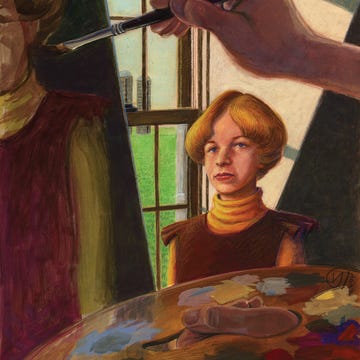She was born Roberta Lynn. She was the daughter of my grandparents’ closest friends. When she was three, she handed her father a cookie and said, “Here’s a cookie for your cookie.” From then on, home in Chicago, she would always be Cookie.
In high school she called herself Bobbe. It was only after she got serious about acting a few years later that she named herself Karyn. She thought it went better with Kupcinet, that the repetition of the hard K made it easier to remember. Her mother, Essee, must have approved, because I don’t think she’d have gotten away with it otherwise. Cookie was never (outwardly) rebellious against her mother, even after she moved to Hollywood. When she graduated from Francis Parker, she enrolled at Pine Manor Junior College. There she studied philosophy and literature. She might have intended to transfer to Wellesley College down the road, a common thing to do then, but instead she dropped out and moved to New York to take classes with Lee Strasberg at the Actors Studio. That lasted about six months. She moved back to Chicago and briefly changed her full name to Lynn Roberts before changing it back to Karyn Kupcinet.
This story appears in Issue 32 of Alta Journal.
SUBSCRIBE
• • •
The following year, 1960, she moved to Los Angeles with her grandmother. Something went wrong. Maybe they didn’t get along. Whatever happened, the grandmother returned to Chicago after a few months. That’s when Cookie began renting a one-bedroom apartment on North Sweetzer. After this point, we know the story. Or at least we think we do.
• • •
The publicity photos are probably typical of the time, the early ’60s, but I’ve noticed something, or I’ve willed myself to notice something. Some hint in her eyes of the wildness that was to come later in the decade? Maybe Cookie was a little ahead of her time. Her look is always different. In one, her hair’s in a short bouffant, in another it’s longer and flowing past her ears in waves. But it’s her expressions, as if she’s constantly testing out a new way to look at the camera. In one, she’s sulky. In another, demure. In the next one, she’s reckless, fierce, Don’t get too close to me. Her facial structure seems to change, too. My mother says Cookie was the first person she ever knew who had “work done.” Always, whatever the look, her eyes are wide. She’s got dreams of making it big. Or maybe they’re really only her mother’s dreams and she’s just playing the part. Who’s to say how much she wanted it? She expected it, this I believe. It went without saying that she’d be a success. Did she crave it? My own family’s take on Essee has always been that she pushed and she pushed and she pushed. If I’m not going to be famous, my kid sure as hell better be. It’s said that Essee got her hooked on the diet pills? I don’t doubt it, but at the same time it feels too easy to blame Essee for everything. She’s too obvious an ogre. Stage mother from the gates of hell. And what about the father, the famous Chicago columnist? Didn’t he push, too? By pulling so many strings, he clearly had the same expectation. The kid gets famous. Period.
• • •
Her first summer in California, she played Annie Sullivan in a summer stock production of William Gibson’s The Miracle Worker at a theater in Laguna Beach. A review in the Los Angeles Times said that she did an admirable job, got the faint Irish accent right, and that the dark glasses she wore throughout the play couldn’t hide the shine in her eyes.
annie: She won’t starve, she’ll learn. All’s fair in love and war.
captain keller: This is hardly a war!
annie: Well, it’s not love. A siege is a siege.
I’m on the kitchen floor of my apartment in Rogers Park, holding a Loyola University library copy of The Miracle Worker over my head, reading out loud words Cookie once spoke, as if my lips forming the words could bring me a little closer to her.
She’s been dead now 60-plus years.
• • •
Annie and Helen spend much of the play whacking each other around. The stage directions go on for pages describing in detail how they chase and hit each other. But in due time, the Miracle Worker triumphs, and Helen comes to a hard-won understanding that there’s a universe beyond herself and this universe is made up of words that represent not only the physical world where she can punch and bite but also abstract concepts such as fear—and love. Helen is no longer entombed in eternal darkness. But Annie’s gift isn’t merely a gift to a single mute deaf blind girl in the Deep South but a bequest to us all, because Helen becomes Helen Keller, a very great American.
annie: I wanted to teach you—oh, everything the earth is full of, Helen, everything on it that’s ours for a wink and it’s gone.
On the kitchen floor, holding the book over my head, I read this pure schmaltz, this unadulterated sugar, and buy every fucking word of it. Where was Annie Sullivan when Cookie needed her?
• • •
In the archives at the Chicago History Museum, I find a press release from Paramount Pictures announcing:
FOR IMMEDIATE RELEASE• DECEMBER 21, 1960
Karyn Kupcinet, daughter of Chicago columnist, Irv Kupcinet, has been signed for a top role in Jerry Lewis’ “The Ladies Man,” Technicolor comedy currently filming in Hollywood.
IRV KUPCINET’S DAUGHTER JOINS
CAST OF JERRY LEWIS’ “THE LADIES MAN”
Paper-clipped to the press release is an ad that appeared in the Chicago Tribune in June of 1961 promoting the Midwestern premiere of The Ladies Man at the Oriental Theatre.
It’s Jerry’s Biggest, Funniest Yet!!!!!!!!!
Everybody’s talking about Jerry Lewis as The Ladies Man????????? Costarring Helen Traubel, Pat Stanley, Gloria Jean, Sylvia Lewis, Dee Arlen, Francesca Bellini, and Hope Holiday as Miss Anxious!
Karyn’s character isn’t named. In the credits, she’s listed as a working girl.
I’ve never been able to get through the whole thing. Lewis squawking and squealing is impossible to endure that long. Cookie nearly steals her one scene. She announces Jerry/Herbert Heebert’s breakfast with such a well-executed eye roll, she takes your mind, mercifully, off of Jerry for a moment. But by my count, she doesn’t have more than four lines.
A top role? What happened? I ask a half-empty garden apartment, a sleeping cat. Was the original Paramount Pictures press release wrong about Cookie from the beginning, or did it become wrong in the course of shooting the movie? Was there a moment when Jerry thought, No, the kid doesn’t have it?
Or what?
• • •
Things got better. In November of ’61, Cookie appeared on two different network shows simultaneously, as a beauty contestant on Hawaiian Eye and a college coed on Mrs. G. Goes to College.
An ad ran that week in the Hollywood Reporter:
Her father, too, put in a plug in his column. “Pardon a point of parental pride, but we’ll be glued to two TV sets on Wednesday night, watching daughter Karyn…”
• • •
In one episode of Hawaiian Eye, Cookie prances around in a bikini with a surprised look on her face.
• • •
Something I’ve noticed about her acting, or at least in the footage I’ve managed to watch. On The Gertrude Berg Show or The Red Skelton Hour, there’s an ambivalence in her affect, as if there’s a part of her who isn’t sure she even wants to be in the scene. Though I’m not sure this makes for great acting, I find it arresting when it seems like any moment she—Cookie or Karyn or Bobbe or Lynn or Roberta—might meander right off the set.
• • •
What do I know about any of this? My own theatrical experience began and ended when I bombed as Chief Brown Bear in a seventh-grade Elm Place School production of Little Mary Sunshine. I forgot a line. Something about forbidding my daughter to go off with that Colorado Ranger Jim, I don’t care how stalwart a scout he is. I tore off my duct-taped headdress and stalked offstage. But it does seem that for a 21-year-old actress at the start of her career, she received an inordinate amount of press in newspapers across the country. One story published in the St. Louis Post-Dispatch was called “Plump Girls Don’t Get Fat Parts.” In the article, she extols the virtues of a high-protein diet, with special emphasis on raw vegetables. There are also stories about her in the Atlanta Journal, Kansas City Star, Norfolk Star Ledger, Cleveland Plain Dealer, Oakland Tribune… In these articles, she’s variously described as curvaceous, big-boobed, not willowy, a delight to the eye. She’s also called self-doubting, giddy, bubbly, ambitious, witty, highly intelligent, and unassuming.
• • •
There’s also a murky quality to some of the photographs. A vagueness in her eyes that allows whoever looks at her to make up their own story about who she is or might become. Pictures where her gaze is almost too welcoming, too inviting. At the same time, she’s hiding?
• • •
As a kid in Chicago, she’d been surrounded by people who were so loved, revered, fawned over, and worshipped for their capacity to become other people. Stars were in and out of the apartment at 257 East Lake Shore day and night. Cookie would come home from sixth grade and Robert Mitchum would be passed out beneath the dining room table. His legs went on for miles.
She’d open the door and Shirley MacLaine would be on the toilet.
“Gimme a sec, cutie.”
How hard could it be? She’d been doing it forever already. When had she ever felt much like herself?
I’m going in circles.
• • •
In Wide Country, Andrew Prine plays a rodeo rider named Andy Guthrie. Mostly he stands around looking tall. He’s got an older brother, Mitch, who does the talking. When Mitch says something tough, Andy juts his chin out and grunts, “That goes for me, too.”
I’m not being entirely fair to Prine, who’d come out to Hollywood fresh from Broadway, where he’d been celebrated for a role in Look Homeward, Angel. But Wide Country made him a minor celebrity. It ran for a couple of seasons on NBC.
He wasn’t a dope. He told an interviewer that he used to make a lot less money doing a lot more work.
In her guest spot, Cookie plays a damsel in distress, a schoolteacher with another passable Irish accent, who’s kidnapped by a band of Apaches. On horseback, Andy rescues her wearing only a towel, his face half covered with shaving cream.
• • •
The college granted me a little research money. I flew out to Los Angeles from Chicago. Spirit to LAX with one stop in Denver. No checked bag. Twenty-five bucks to stick a backpack under the seat. Four and a half hours of turbulence.
For the first few hours on the ground, I was ecstatic. Field research was everywhere I looked. The rental car counter was field research. The NPR station (KCRW) was field research. Parking. Starbucks. I booked a room at the Culver Hotel. It’s famous because Munchkins just off the set of The Wizard of Oz once trashed the place. On the walls of the bar downstairs were framed pictures of solemn-looking Munchkins. Must have been taken before they got rowdy. After a nap, I went to where the morgue used to be before they tore it down. I got out of the car and paced along the sidewalk, pensively, hands behind my back, performing contemplative research.
I drove over to 1227½ North Sweetzer. The ½ had always seemed fantastical, as if it had never been a real address at all. The fraction was right there on the sign. Monterey Village Apartments. And nothing seemed very different from the photographs I’d studied. Swap out the cars like they do in the movies and (insert that French word that starts with a v) it’s 1963. Tall palms out front. Trees that must have been here when she was here. Trees she might have smelled or seen without looking at them, the way I didn’t look at them as I hustled through the tunnel with the mailboxes, the dark little cave. I ran my finger across the dust of the mailbox for 7B. There was that narrow frame where you slip in a piece of paper with your name, but it was empty. On the other side of the tunnel, a fountain softly gurgled as it had 60 years ago. A living museum of a place that had existed in my thoughts for so long. A bike was chained to a post. Lots of plants, well cared for, but also slightly unruly. I climbed the stairs. Her door. The first one on the right. The only one on the right.
• • •
I stood at the top of the stairs and waited, as if at some point she was going to burst out of 7B late for an audition with wet hair.
Cookie paid $150 a month, utilities included.
On my wall, a photograph of two deputies carrying a stretcher down the same set of stairs.
I don’t know how long I’d been standing there when a young woman began climbing the stairs carrying groceries, a tall bag in each arm. Out of one of the bags poked a bunch of bananas. She was in her late 20s, early 30s. Sunglasses shoved up on her forehead. A flood of curly black hair. Long earrings in the shape of grasping hands, like they were holding on to her lobes for dear life. When she reached the top, she was frazzled, annoyed. Monday and already a lurker?
“Cary Grant? Across the courtyard. 3A.”
“No,” I said.
“Randolph Scott? He was really only here a month. He never signed a lease, but he was in—”
“Karyn Kupcinet.”
“Who?”
“She lived in 7B for two years and 10 months.”
“What was she in?”
“Some shows and a Jerry Lewis movie.”
“Offed herself?”
“Why do you ask?”
“Jerry Lewis.”
I love you. “Free for a coffee?”
Kind of her to shake her head with slight regret.
“The way you added the 10 months. Did she?”
“My mother thinks so.”
“What do other people think?”
“That she was strangled.”
She put her bags down outside her door. “What does your mother say to that?”
“She doesn’t get that far into it.”
“But you do?”
“I’m on a small grant.”
“You’re writing a book?”
“In my mind.”
“Aren’t we all. Strangled is a better story.”
“Is it?”
“Why are you wearing hiking boots?”
“Field research.”
We stood there outside her door.
“You can’t come in the apartment.”
“I totally get it.”
She shifted her key ring from one hand to the other and back again.
“If she did, why do you think she did?”
“The list goes on. Trouble with a boyfriend. Not a lot of work. She got caught stealing. Also, an abortion. And she wrote these crazy notes. Like threats, but they didn’t make a ton of sense. Anyway, there was an autopsy. A broken bone in her neck. Same bone as Jeffrey Epstein. But if she did, she didn’t do it like Epstein. It’s confusing. They found her on the couch.”
“Who’d she threaten?”
“The boyfriend. But also herself.”
“I don’t get it.”
“The case is still open.”
She bit her lip and raised her sunglasses higher on her head. A signal. She’d had enough. This was a little interesting, but that was enough. There were people in her life who knew what it meant when she pulled her sunglasses up higher on her head.
“Can I just take a quick peek, just to see where—”
• • •
As I was passing by the fountain, she called down to me: “Things go missing. I’m not kidding. I’ll drop something. Lipstick. My favorite pen. A $20 bill. I could look for days, it’s gone. Not in the cushions of the couch, not under the rug. I mean gone gone.”
• • •
There must have been good days. Out there on the steps. In spite of everything that had already begun to pull her down. Slippers and an old cashmere topcoat of her father’s. She’d make a cup of instant coffee and sit on the steps and read. If she was out of cream, she didn’t mind it black. The library wasn’t far, and she’d stagger out of it with a stack of books. Why finish one when there’s always another to start? And maybe those days when she was home, when she had no auditions or rehearsals, she’d take a break from reading and wander down the streets and listen to people taking showers. Some of her neighbors worked nine to five, but many didn’t. She’d come to love the sound of people taking showers in the middle of the day. Something hopeful about that rush of water.
• • •
Late morning. Curled up against Andy, who’s turned away. Morning after a long night of drinking and arguing the same argument. Andy wants more freedom. Cookie shouts, “Define freedom!” Andy says if he has to define it, he doesn’t have it. Cookie: “See, there it is, you can’t!” She was 22 and he was, what, 26, 27? Back and forth like that until they were both so drunk and zonked, they flopped back into each other’s arms.
Now the light through the windows. She wakes but doesn’t open her eyes. For a couple of moments, she has no idea where she is. She’s hot, there’s skin. Not hers. A pleasant disorientation. Like remembering you’re alive. Mostly we forget. Andy’s bedroom. 211 Stanley Hills Drive. She opens her eyes to all that light in the trees. It could be noon already. Sunday? Tuesday? Cookie reaches across his body, boggy with sleep, and kisses his gaping oaf of a mouth. He murmurs and edges away.
She wonders if love is always independent of everything else, including the object being loved. That mutuality not only isn’t a requirement, it’s got nothing to do with it. Love is freedom? There’s your freedom, Andy. What did Sartre say? We absorb the other but the other cannot absorb us? Do I have that right? What do you think of Mr. Sartre, Mr. Prine? Care to comment?
• • •
If only she could shut her mouth sometimes. Of work, she talked a blue streak. About handsy producers: “They’re like crabs constantly nipping at you.” About the catty bitches on the set of The Ladies Man, especially that one who, in the movie, plays the trombone in bed, Lillian Briggs. Cookie couldn’t stand Lillian Briggs. She carried that stupid trombone everywhere even though she couldn’t actually play a note. In the movie, Cookie told Andy, they overdubbed her.
And Jerry? One minute he’d smack you on the lips with his sloppy, wet mouth, the next he wouldn’t know who you were or what you were doing on his set. Two years ago now and she’s still talking about it.
She tried so hard not to be a chatterbox, because she knew that too many paragraphs in a row confused him. It never worked, because even when she was silent and only staring at Andy, words, words, words would fall out of her eyes.
Cookie uncurls and gets out of bed. The sheets so tangled. Yanks one off the bed and wraps herself up. The light through the trees. Andy snores loud, watery snores. Needs a longer mattress. Her father once took her down to Springfield. She remembers a picture of Lincoln on his little deathbed, his feet dangling.
Maybe you’ll play him sometime, Andy.
• • •
Hold this moment of peace, she thinks. Grip it.
She reaches and grabs a fistful of Andy’s thigh and twists it. He groans but doesn’t wake up.
“I’m pregnant, you stupid galoot.”
• • •
She never did tell him. Not while he was awake, anyway.•
Peter Orner’s memoir, Am I Alone Here?, was a finalist for the National Book Critics Circle Award. His stories have been anthologized in Best American Short Stories, and he has twice received a Pushcart Prize. He is a former member of the Volunteer Fire Department in Bolinas, California.















